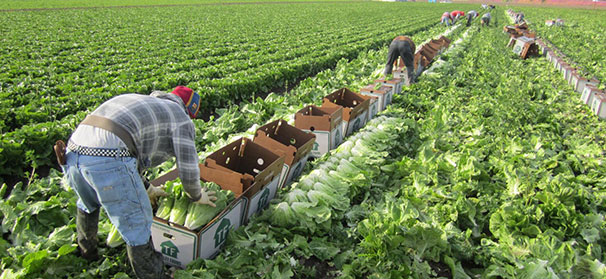Sep 27, 2019FDA, others to study human pathogens in Yuma region leafy greens
The U.S. Food and Drug Administration has launched a new initiative with support from the Arizona Department of Agriculture to better understand the ecology of human pathogens in the environment in the Yuma agricultural region.
This initiative – conducted in conjunction with the University of Arizona Cooperative Extension, the Wellton-Mohawk Irrigation and Drainage District, and members of the Yuma area leafy greens industry – will be a multi-year study that will focus on how these pathogens survive, move and possibly contaminate produce prior to harvest.
The launch of this initiative follows the largest E.coliO157:H7 outbreak in the United States since 2006. The outbreak, which was linked to romaine lettuce grown in the Yuma region, began in the spring of 2018 and resulted in 210 reported illnesses from 36 states, 96 hospitalizations, 27 cases of hemolytic uremic syndrome (HUS) and five deaths. In response, FDA led an Environmental Assessment (EA) of the Yuma produce growing region in collaboration with Centers for Disease Control and Prevention (CDC), the Arizona Department of Agriculture (AZDA), Wellton-Mohawk Irrigation and Drainage District (WMIDD), and state partners from June through August 2018.
While the EA was useful in narrowing the scope of the outbreak, many questions remain unanswered regarding the specific origin of the pathogen, the environmental distribution, and potential reservoirs for the outbreak strain. The findings made clear that further collaboration among leafy greens stakeholders and FDA is needed to better understand potential sources of microbial contamination, the prevalence and persistence of human pathogens in the ecosystem near growing areas, and the best management practices to prevent future outbreaks from occurring.
Throughout this initiative, FDA will work in partnership with water quality, food safety, and agricultural experts from the University of Arizona Cooperative Extension, representatives from the WMIDD, and members of the Yuma area leafy greens industry. Research teams will be collecting and examining samples from the environment such as surface waters, canal sediment, and dust. The team will also be collecting scat samples to assess the impact that animal intrusion and native wildlife may have on the growing environment.
Shiga Toxin-Producing E.coli (STEC), of which E.coli O157:H7 is a strain, causes roughly 170,000 people to become ill every year. This generally happens through the consumption of contaminated food or water, or close contact with STEC-infected animals. Between 2009 and 2017, FDA and our partners at CDC identified 28 foodborne STEC outbreaks with known or suspected links to leafy greens. Like a lot of fresh produce, leafy greens are often eaten raw without a kill-step, such as cooking, that could eliminate pathogens that may be present.
The Yuma agricultural region, which encompasses Yuma County in Arizona and the Imperial Valley in California, is a leader in the production of leafy greens in the United States. The findings from this study will contribute new knowledge on how various environmental factors may influence bacterial persistence and distribution in this region, and how those factors may impact the risk of this commodity becoming contaminated. Results from this collaboration will lead to improved practices to prevent or mitigate food safety risks, and ultimately enhance the safety of produce grown in the region.
For More Information
- Environmental Assessment of Factors Potentially Contributing to the Contamination of Romaine Lettuce Implicated in a Multi-State Outbreak of E.coli O157:H7
- Letter to State Agriculture Officials and the Leafy Greens Industry Concerning the Environmental Assessment
- FDA Investigating Multistate Outbreak of E.coli O157:H7 Infections Linked To Romaine Lettuce from Yuma Growing Region
- CDC Multistate Outbreak of E.coli O157:H7 Infections Linked to Romaine Lettuce (Final Update)

















